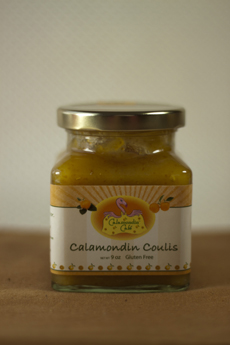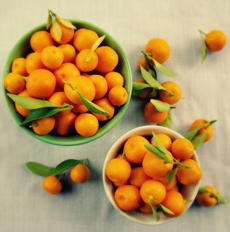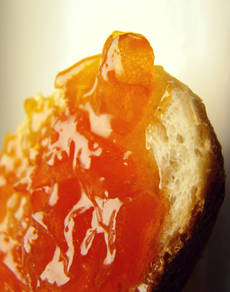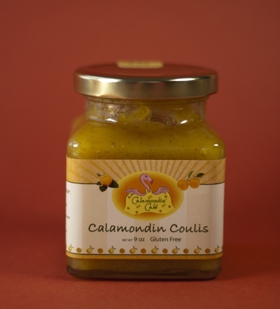

Calamondin coulis, or marmalade. Photo by Elvira Kalviste | THE NIBBLE.
|
STEPHANIE ZONIS is a contributing editor.
|
|
December 2012
|
 |
Calamondin Coulis: A Marmalade-Like Delight
This Exotic Citrus Deserves A Place On Your Table
Check out the other vey special gourmet food gifts in this series.
Cala-what, you ask? Calamondin, pronounced CAH-luh-MONN-den.
The Calamondin is a citrus variety that originated in China; it was introduced to the U.S. sometime around 1900. The variety is also known as acid orange, calamandarin, calamonding, Chinese orange, golden lime and Panama orange.
The tree grows well in Florida, but, according to the Texas A & M Horticulture website, it’s “grown more for its looks than its fruit edibility.”
That may have been true for many years, but taste Calamondin Café’s Coulis, and you’ll understand that things have changed.
Sure, the coulis* looks a lot like marmalade, but it doesn’t taste like any marmalade I’ve ever had. To begin with, much less sugar is used than in a conventional marmalade, and the product is cooked for far less time. This means that you get a burst of fresh-tasting, sweet-tart flavor with every bite.
And no, it isn’t excessively tart. I don’t do well with excessive tartness, but you can keep your morning toast; I’ll eat this right off the spoon!
You’ll know right away that this is citrus, but that foodie friend who knows it all won’t be able to put his or her finger on the exact type of citrus, because the calamondin has a unique flavor.
There’s a little butter in the coulis, too, so you get a depth of flavor and richness you otherwise would not.
What else do I like about Calamondin Café? The founder and CEO, a physician, uses no
plastics in packaging her products for shipment. |
|

Calamondin oranges. Photo courtesy FamilyFeedbag.com. |
- In the kitchen, composting is practiced.
- The Calamondin purée, once processed, is frozen in glass or BPA-free plastic. No herbicides are used.
- In growing the fruit weeds are hand-pulled or removed via weed whacker.
- Of the pesticides that are used, 95% are certified by the Organic Materials Review Institute.
- The company employs agricultural practices so gentle that two endangered species nest in the groves (gopher tortoises and burrowing owls).
If you’re looking for an uncommon fruit preserve this year, or hadn’t even thought about a fruit preserve as a gift, consider this coulis. |
|

Want to make your own? Get a recipe at FamilyFeedbag.com. |
What Is Coulis?
French for “strained liquid,” coulis is a sauce made from puréed and strained fruit or vegetables (strawberries, raspberries, and tomatoes are most commonly used).
A coulis (pronounced coo-LEE) is often served over breakfast items, such as pancakes, crêpes and waffles or pancakes, or over dessert items, such as ice cream, cheesecake and soufflés.
The term became popular during the ascent of nouvelle cuisine that in the 1980s, when newer items such as basil, mint and tomato coulis were appearing on plates, to make the preparations seem different and even more exciting than a traditional purée. To split hairs, in a coulis the liquid has been strained, removing any seeds or fiber. A purée is not necessarily strained, although professional chefs would be trained to strain their purées.
Check out all the types of fruit spreads in our Jam & Jelly Glossary.
CALAMONDIN CAFÉ COULIS
A Marmalade-Like Fruit Spread
- 6-Ounce Jar
$12.00
- 9-Ounce Jar
$18.00
Buy online at CalamondinCafe.com.
Prices are verified at publication but are subject to change. Shipping is additional.
|

A gift or stocking stuffer for the foodie. Photo by Elvira Kalviste | THE NIBBLE.
|

|





